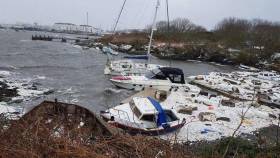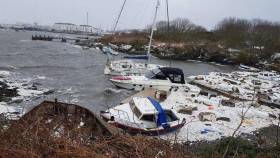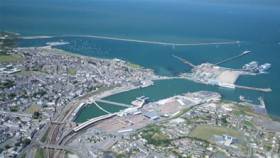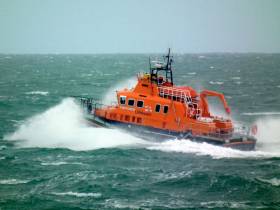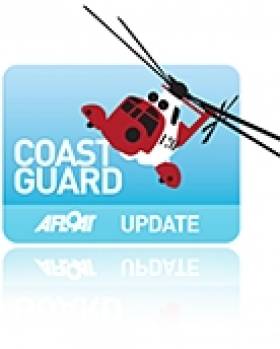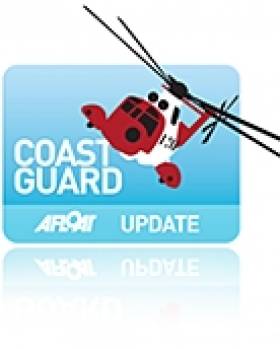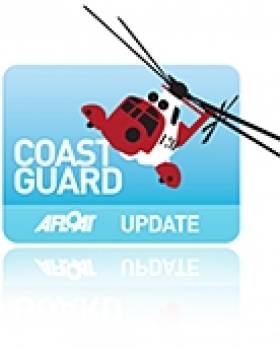Displaying items by tag: Holyhead
Holyhead Sailing Club Make Contingency Plans for ISORA Race Start After Storm Emma's Damage
Holyhead Sailing Club (HSC) is working on contingency plans to host the ISORA fleet following the devastation to the North Wales Marina during Storm Emma.
it is unlikely the damage will be repaired in time for the ISORA events planned in Holyhead this year but it is not stopping the HSC team from coming up with alternatives.
The ISORA start for race three on 12th May and also the finish of race four on 26th May are due to take place at Holyhead.
As Afloat.ie reported at the time, the damage in Holyhead both to its racing fleet and the marina pontoons was severe.
Holyhead Marina & Yachts Devastated By Storm Emma (Video)
Force 12 winds that battered Holyhead Marina, Anglesey have left the marina 'in bits' and boats berthed in the North Wales facility are reported as 'lost'.
The sad scene became apparent at first light this morning. It is understood yachts in the marina that were involved in the winter racing series were sunk and there is very little left of the marina itself.
The video below was taken at 08:38 this morning.
The Holyhead lifeboat was moved to the inner harbour for continuing service.
£4m Investment by Stena Line to Upgrade Holyhead Port
#FerryNews - More than £4m by Stena Line is to be spent on upgrades to improve infrastructure at the Port of Holyhead after recording a record year for freight growth.
The upgrades will include the creation of additional freight space at the Port and also extensive refurbishment to the Terminal 3 ramp. The work began last Friday and is take approximately five days to complete.
Captain Wyn Parry, Stena Line’s Irish Sea South Ports Manager, said: “We’re always looking at ways to improve our facilities for our freight and travel customers and the two upgrades will certainly have a positive impact on our ability to remain competitive and efficient.
“The new lower deck of T3 was fabricated by McGregor Ltd and transported to the Port by barge. Unfortunately the exchange to the new linkspan will mean a minor inconvenience to Port customers but we have worked hard to minimise the impact.”
Holyhead Lifeboat Launches To Ill Sailor In Irish Sea
#RNLI - Holyhead RNLI’s all-weather lifeboat was launched last evening (Monday 22 May) after a man fell ill on board his sailing boat in the Irish Sea.
The station’s Severn class Christopher Pearce launched at 6.25pm after the man, who was sailing for the port of Holyhead in North Wales, had become ill and made the correct decision to call for help.
Due to the vessel’s location, a large tanker diverted from its course to shelter the stricken craft.
Once the lifeboat arrived minutes later, one volunteer was transferred onto the boat with the lone sailor, who was able to rest while the RNLI crew took his 27ft vessel in tow.
About 20 minutes into the tow, the crew member aboard reported the sailor’s condition was worsening and he was developing chest pains and breathing issues.
The tow was then released and the lifeboat went back alongside to transfer another crew member aboard with more medical equipment.
The casualty’s condition continued to worsen and the need for an immediate evacuation of was needed, so the casualty was transferred to the lifeboat ahead of a medevac by helicopter from HM Coastguard while his boat was brought into Holyhead.
Coxswain Tony Price said: “All at Holyhead RNLI are hoping the man made a swift recovery.”
Yacht 'Stolen' in Holyhead – Irish Marinas Asked To Be on The Lookout!
Dun Laoghaire marina on Dublin Bay has relayed a call for any information on a yacht reportedly 'stolen' (pictured above) from Holyhead marina in Wales. The name is ‘FRAM III' but they are unsure if it is on the vessel or not. Please be on the lookout for the following: Vindo 38, Long Keel Ketch, White Hull, Topsides varnished.
Please call with any information. 0044 1407764242
UPDATE: Afloat.ie Reader Leads Gardai to 'Stolen' Welsh Yacht in Malahide
Three Men & A Baby Rescued By Holyhead Lifeboat
#RNLI - Holyhead RNLI lifeboat volunteers' training turned into a real-life rescue last night after distress calls were heard from a boat carrying three men a baby in the Irish Sea.
At 6pm crew members were at the lifeboat station training when they heard a call for help over the VHF radio. They immediately raised the alarm by calling Holyhead Coastguard, who requested the launch of Holyhead RNLI's inshore lifeboat and asked the station's all weather lifeboat to be on standby.
The inshore lifeboat and its volunteer crew made their way to the Bolivar buoy near Carmel Head, where the 33ft Fairline motor vessel was at anchor and stuck fast.
On arrival, they called for the all-weather lifeboat to assist and Holyhead RNLI's Severn-class lifeboat made her way the scene.
After attempts to free the casualty vessel’s anchor, the anchor warp was severed by crew members to get the casualty vessel moving again, and a buoy was left as a marker before the vessel was towed to safety and delivered to Holyhead Marina.
There were four people on board the boat: three adults and a very young baby. All were unharmed.
Holyhead RNLI coxswain Brian Thomson said: "This call-out emphasised the importance of going to sea prepared – wearing correct lifejackets, having proper flares and safety equipment, knowing the waters into which you are going and knowing how to correctly use VHF radio."
#isora – Racing under the burgee of the National Yacht Club, the third race in the Irish Sea Offshore Racing Association (ISORA) 2015 series will start from Scotsman's Bay on the south side of Dublin Bay early on Saturday morning. The Irish offshore fleet is fitted with yellowbrick trackers for the 60–mile race across the Irish Sea from Dun Laoghaire to Holyhead, an important warm up for next month's Dun Laoghaire to Dingle race, also from the NYC.
The reigning ISORA champion Ruth skippered by Liam Shanahan was the winner of April's first race coastal race of the season, a fortnight ago. The NYC J–109 took a six minute win on corrected time from the Irish National Sailing Club Reflex 38 Lynx skippered by Kenneth Rumball. Third in that race was the Arklow Sailing Club J122, Aquelina.
ISORA Race three sailing instructions are downloadable below.
Fishing Boat Skipper Saves Crew With Swift Action
#holyhead – Holyhead Coastguard Operations Centre coordinated the rescue of three fishermen last night after their vessel started taking on water at the start of its fishing trip.
At 22.22 yesterday the fishing vessel 'Cesca' reported that it was on route from Milford to Conwy and was taking on water. The crew were using pumps to try and keep the level of water down but they weren't able to keep up with the flow. As the situation was getting worse they called the Coastguard for assistance.
The RAF search and rescue helicopter based at RAF Valley was sent to the scene. Whilst trying to drop more pumps on the fishing vessel the 'Cesca's' engines stopped and the Captain made the decision to abandon ship. The crew were winched by the helicopter and taken to safety.
HM Coastguard Robert Bowyer said:
"It's often a difficult judgement call for any Captain to call for assistance and even more difficult to leave his vessel, which is his livelihood. By calling for assistance when he did the Captain of the 'Cesca' gave the rescue services time to get on scene and try and save his vessel. Although they did have to abandon ship he and his crew are safe and well this morning."
Holyhead Coastguard Operations Centre (CGOC) Becomes part of New HM Coastguard Network
#coastguard – Holyhead Coastguard Operations Centre (CGOC) is to become part of the new Coastguard national network for the very first time this week.
Work has been carried out at the search and rescue coordination centre to upgrade the technology and introduce new systems. This means Holyhead CGOC will be connected to the National Maritime Operations Centre (NMOC) in Hampshire and other Coastguard stations around the country, which will be able to offer mutual support during busy periods.
From January 2015, Holyhead CGOC and the new national network will start to take on operations from Liverpool Coastguard.
The changes to Her Majesty's Coastguard will see the NMOC and 10 other CGOCs around the UK work together to manage the workload. There will be no reduction in rescue resources. The availability of Coastguard Rescue Teams, lifeboats, rescue helicopters and other rescue units will be unaffected.
Graham Clark, Maritime Operations Controller at Holyhead CGOC, said:
"The way we deliver the coordination of search and rescue operations on our coast and out at sea is changing. But the public won't notice any difference. If you call 999 and ask for the Coastguard, or issue a mayday broadcast, we will still be here to help you.
"The new national Coastguard network will be able to oversee and assist with operations around the whole of the UK. Here at Holyhead CGOC we're now part of this network, so we can call upon help from our fellow Coastguards elsewhere in the country, and also in turn help them out if needed.
"It's vital to remember though that the rescue teams in your community are unaffected. There will still be the same number of lifeboats, Coastguard Rescue Teams, helicopters and other rescue resources."
The new national network is scheduled to be fully operational by the end of 2015.
Search for Missing Boy off Holyhead
#coastguard – Coastguards are this afternoon searching for a 12-year-old boy who is believed to have been swept out to sea at Aberffraw.
Holyhead Coastguard received a 999 call at around 12.30 this lunchtime reporting that three people were stuck on rocks in the estuary. Further information then suggested that two men had managed to make it back to shore, plus a young boy; however another youngster was caught in the large waves and swept out to sea.
The Rhosneigr, Holyhead, Bangor and Moelfre Coastguard Rescue Teams along with two Coastguard Sector Managers are currently involved in the search, alongside the RNLI lifeboats from Porthdinllaen, Holyhead, and Trearddur Bay, the search and rescue helicopter from RAF Valley and North Wales Police.



























